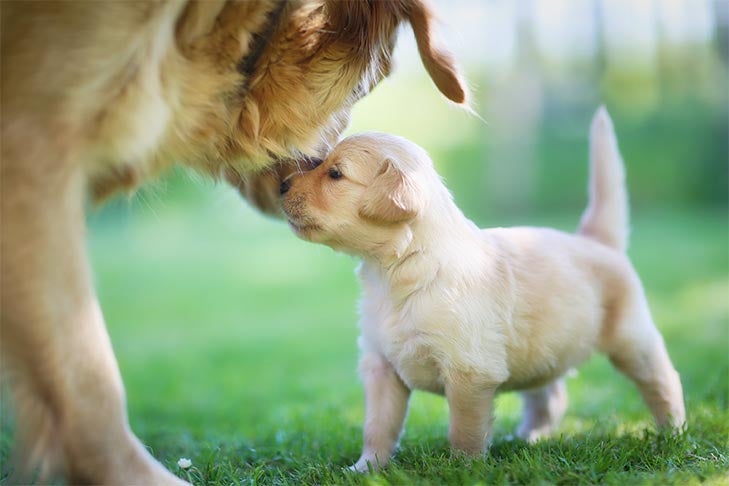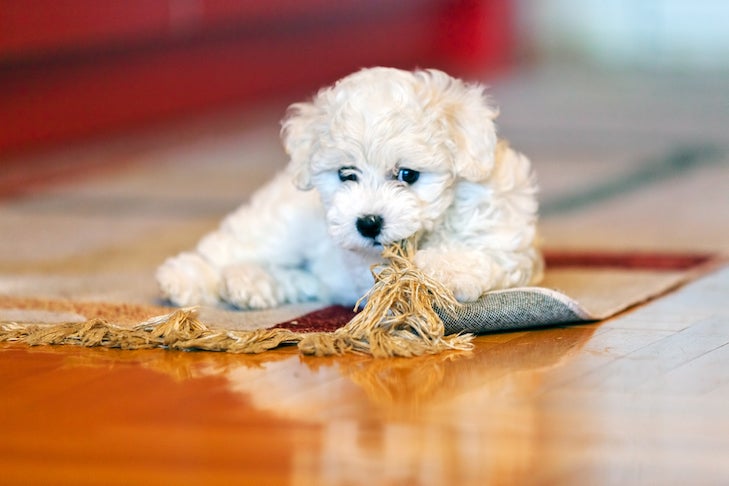
As with introducing kids and dogs, the temperament of your senior dog should be considered when evaluating which puppy will make a good addition to your home. Differences in size, physical fitness, and medical history are huge factors to consider when blending young puppies and older dogs into one family, according to Dr. Klein. And size can go both ways. Be sure to spend time researching dog breeds to decide which ones could be the best fit for your family and lifestyle. AKC PuppyVisor can provide personalized advice and support for puppy seekers who are new to the process or need expert advice on breeds, temperament, activity level, grooming needs, and other important considerations.
“Sometimes the ‘younger’ puppy can be of a giant breed and tower over and threaten the senior dog who may have underlying heart or osteoarthritic back or spine issues,” says Dr. Klein. “Even a small relentless puppy can jump and tug on a [larger] senior ailing dog, potentially causing medical issues or mental anxiety.”

Precautions for New Puppies to Ensure Senior Dog Health
Puppies should be examined by a veterinarian ideally before entering a new environment, to ensure you’re not introducing any health issues into the mix. Also, both puppies entering the new home and older dogs already in the home should be up-to-date on their vaccines, including core vaccines like:
- Distemper
- Adenovirus (canine hepatitis)
- Parvovirus
- Rabies (if the puppy is four months or older)
Your vet may also recommend getting your dogs up-to-date on additional vaccines, depending on the age of the puppy, including:
Both your senior dog and new puppy should be examined, and as part of the checkup, your veterinarian should:
- Perform a fecal exam 3–5 days before introducing the two dogs and both tests should produce negative results.
- Check to make sure neither the adult nor the puppy has any form of ectoparasite (i.e., fleas and ticks).
- Ensure your senior dog is free of heartworm and is up-to-date on preventative treatment. If the puppy is old enough for the test, they should be tested for heartworm as well
Once your new puppy is introduced into your home, another important thing that can help prevent ER trips for both dogs is reading the labels of any medications for either dog. Always double check to make sure to give the right medication to each dog.
Senior dogs are creatures of habit and crave their routine and consistency. Any disruption could cause anxiety or possibly result in jealousy or envy, cautions Dr. Klein. His advice includes:
- Focus your attention on your older dog before greeting your younger dog
- Feed your older dog first
- Put the leash on your older dog first
“These small gestures can make a huge difference in the attitude of your older dog,” says Dr. Klein. He notes that younger puppies will have no established routine and won’t really care about the order of things.
Until you can be sure of how your puppy will behave while you’re gone from the home and how the two dogs will interact with each other, never leave your puppy loose in the house unsupervised. Depending on the dynamics, it may take anywhere for days to months until the two dogs can be left freely roaming together while you’re gone.
Consider keeping your puppy crated when you’re not around. This is one way to ensure your little one will remain safe and secure. Doing so will also prevent your puppy from potentially disturbing your senior dog.

Set Ground Rules for New Puppies
To avoid any territorial behavior or resource guarding, senior dogs and new puppies should first be introduced on neutral ground, rather than in your home or yard. Once they’ve both acclimated to living together in your home, take measures to avoid your senior dog feeling boxed out. For example, your senior dog should feel like their belongings – toys, chews, etc. – still belong to them and not the new puppy.
Make sure your senior dog is given time separate from the new puppy and vice versa. Constant contact can be a recipe for conflict, and one way to head that off is to give each dog some alone time to relax. Both dogs need individual time and attention for themselves, away from each other.
Some Things With New Puppies Are Easier Than Others
Having an older dog around may make training and housebreaking your younger puppy easier, since the older dog may serve as a role model.
Feeding two dogs, on the other hand, may be challenging. One may eat all of the other’s food, especially if the other is a slow eater. And if food tolerances are in the mix, simultaneously feeding both dogs may be impossible. Other issues to look out for include territorial behavior around mealtime (and toy and treat time).
“Fights have been known to start because of these issues,” cautions Dr. Klein, recommending that the dogs never be unattended during feeding, in the beginning, to help with the transition.
Need help with your adorable new puppy? Training your dog can be challenging without expert help. That’s why we’re here to help you virtually, through AKC GoodDog! Helpline. This live telephone service connects you with a professional trainer who will offer unlimited, individualized advice on everything from house-training to behavioral issues.



Considering adding a new puppy or new puppies to your family, with a senior dog already at home? There are certain precautions you’ll need to take to maintain your older dog’s mental and physical health during this time of transition. Here’s what Dr. Jerry Klein, Chief Veterinary Officer for the American Kennel Club, offers as advice.
Finding the Right Puppy For Your Family